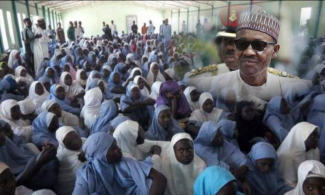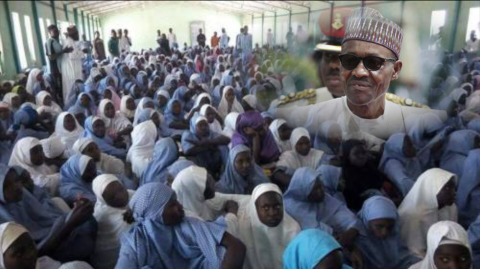
When an administration substitutes propaganda for statecraft a time comes when reality collides with falsehood and blows up in the face of the administration. When an administration does not realize that a campaign and its political lies are different from governing and that, after victory, the former should give way for the latter, such an administration becomes trapped in its own web of deception. When that happens, it begins to believe its own lies, its own press clippings. This is what has happened to the Buhari administration.
An even worse outcome of governance by deception is that the propagandist begins to gradually inhabit the false, alternate informational universe he has created. That’s what happened to the Buhari administration regarding the kidnap of more than hundred schoolgirls from the town of Dapchi in Yobe State.
The Buhari administration has created a vast, incestuous informational loop that is meant to deceive the citizenry into believing that it has vanquished Boko Haram and made the Borno-Yobe theater of the war safe and peaceful. Phrases such as “technically defeated,” “degraded,” and lately, “completely defeated” have gained currency as staples of the government’s claims about how the war against the terrorists is going. The administration has persisted in this deception even as news oozing into the public square through non-governmental and interpersonal channels, and away from the government’sinformational filter, have contradicted and falsified its claims of Boko Haram being defeated and its capacity to launch attacks being decimated.

One of the consequences of such lies is that they lull citizens into a belief that their surroundings are safe. Another consequence is that, over time, even the army, key partners in the wartime propaganda machine of the government, begins to believe that the non-existent universe of peace and safety it has posited is real and begins to act according to that belief.
This is what happened when the army, believing, according to its Deputy Director of Public Relations, Colonel OnyeamaNwachukwu, that Dapchi was calm and safe, removed troops stationed there more than a week before the attack on Government Girls Technical Secondary School, Dapchi.
Dapchi was an unfortunate reality check for the government’s exaggerated claims regarding the Boko Haram war. That is why the administration was caught flatfooted by the abduction. That is also why its initial attempts to deceive the public by claiming that the abducted girls had returned or had been rescued quickly unraveled. At some point, they would have had to produce the abducted girls to be believable, to convince the public against what would have been firsthand contrary testimonies of parents of the kidnapped girls.
The Buhari administration’s behavior in respect of Dapchi is symptomatic of a broader strategy of governing through deceit, concealment, and informational manipulation. This strategy has trickled down to its supporters, who have now established an elaborate industry that specializes in denial, deflection, and the rank hypocrisy of conveniently abandoning principles and standards they previously claimed to uphold. Protecting and defending the administration’s reputation and excusing its failures are core features of this new Buharism.
The Buhari excuse and rationalization industry may eventually force some of us to apologize to former President Jonathan if the denizens of that industry, the holdout, dug-in Buharists, continue in their current manner.
The products of this industry are already forcing some of us to question the patriotism and sincerity of those who became overnight revolutionaries in 2015, mouthing what seemed like primordially neutral commitments to accountable governance but which in hindsight were nothing more than commitments to enlightened political and ethnic self-interest.
Many of the same things we rightly condemned under Jonathan and appropriately blamed on his stewardship or lack thereof are today either being rationalized or blamed on other entities.
If you listen to the dwindling tribe of Buharists, the epileptic power supply in the country today is not Buhari's failure, it is Fashola's, even though the latter serves at the pleasure of the former and reflects and implements his vision for the power sector.
Fuel scarcity and exorbitant pricing of petroleum products are not Buhari's fault but that of Kachikwu, NNPC, fuel marketers, and of course the nebulously defined "hoarders." When it comes to the ongoing fuel supply crisis, the proverbial buck no longer stops at the president's desk; it takes detours to the desk of others, never mind that Buhari ran for the presidency on the promise to fix the refineries, wean us off fuel importation, and end both scarcity and subsidy. Never mind that Buhari is the minister of petroleum resources.
The rising insecurity defined by an exponential increase in both kidnapping and armed herdsmen violence is blamed on "security agencies," not on Buhari who appoints the heads of these agencies and, as commander-in-chief, sets the agenda for them.
The economy has been mismanaged into a hellish hodgepodge of inflation, de-industrialization, mass layoffs, rising unemployment, widespread hardship, falling standards of living, high cost of living, and a decimated middle class. The Buharistssay, however, that Buhari is not to blame but the trio of Osinbajo, Kemi Adeosun, and Godwin Emefiele. In a narrative that inverts logic, they even argue that the economic meltdown under Buhari is a sign that his "policies" are working. They have given a new spin to the familiar "pain before gain" adage; they have redefined the semiotic properties of chaos theory in social science.
In 2014, they screamed that Jonathan had failed to protect the schoolgirls of Chibok and they rightly blamed the kidnap on his failings as Commander-in-Chief. Today, the Buharists say the "security agencies," not Buhari, failed to protect the schoolgirls of Dapchi.
There are many other examples that similarly point to the fact that Buharists' love affair with Buhari is a case study in cognitive dissonance and that it borders on the psychological bond some captives forge with their captors--the so-called Stockholm syndrome.
I saw the most dramatic illustration of this phenomenon on someone's Facebook timeline a few days ago. I hope it is fake news. However, knowing the cult of personality that the love of Buhari has become — a love that surpasseth all understanding — I would not be shocked if it is not. This Facebook interlocutor quoted the father of one of the kidnapped Dapchischoolgirls as saying in a BBC interview that he believes that the kidnapping was done to besmirch and bring down Buhari'sgovernment.
Take a moment to process this statement, which, if true, would give us a glimpse into the almost-religious devotion that defines the relationship between Buharists and Buhari. He can do no wrong in their eyes.
Even when Boko Haram, which his government claims is "completely defeated," invades a school with many gun trucks unchallenged, loads more than a hundred school girls onto trucks, and drives away, again unchallenged, the invasion is attributed to the president's enemies, not to his failures, not to his government's penchant for creating false, alternative universes through propaganda and deception, which then lulls people into a false sense of security, leaving schools and other so-called soft targets exposed and vulnerable.
Buhari had the perverse benefit of Chibok (which Jonathan did not have) and yet failed to take adequate measures to protect schools in the war zone. Apparently, not even this indicting, fatal factoid is enough to come between Buhari and Buharists.
If this story is true, it tells us that, for some Buharists, not even the failure of Buhari's administration to protect their daughter from Boko Haram kidnappers is enough to separate them from the subject of their unquestioning devotion.
We live in interesting times and it appears that our taken-for-granted rules of politics are being rewritten by the willingness of some of our compatriots to extend an infinitely long leash to president Buhari.
The author can be reached at [email protected]